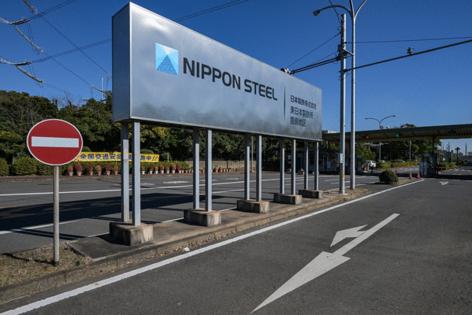Biden blocks Nippon Steel's $14.1 billion takeover of US Steel
Published in News & Features
President Joe Biden has blocked the $14.1 billion sale of United States Steel Corp. to Nippon Steel Corp., killing a high-profile deal that sparked a political firestorm and tensions between the U.S. and Japan.
Biden announced his formal decision on Friday after the case was referred to him by a U.S. security review panel, ahead of a deadline early next week.
“We need major U.S. companies representing the major share of U.S. steelmaking capacity to keep leading the fight on behalf of America’s national interests,” Biden said in a written statement, adding that the deal “would place one of America’s largest steel producers under foreign control and create risk for our national security and our critical supply chains.”
Shares of U.S. Steel dropped 5.5% to $30.80 at 9:35 a.m. in New York. U.S. Steel and Nippon Steel didn’t immediately comment on Biden’s decision.
The companies have signaled that they may challenge the legal grounds of any block, raising the prospect that the matter will remain in dispute. President-elect Donald Trump has also pledged to block the transaction.
Investors had priced in low odds that the offer of $55 a share would proceed, but Biden’s decision may cap a year-long saga, despite concessions from Nippon Steel regarding employment, investment and local leadership.
“U.S. Steel will remain a proud American company – one that’s American-owned, American-operated, by American union steelworkers – the best in the world,” the president said in the statement.
Biden’s announcement was a massive victory for United Steelworkers President David McCall and his union’s leadership, who have been vocally opposed to the deal, even as some rank-and-file labor members spoke out in favor of it.
McCall in a statement Friday said that Nippon Steel has undermined the domestic steel industry and that allowing the deal to advance would destabilize the U.S. trade system and compromise national security.
“It’s clear from U.S. Steel’s recent financial performance that it can easily remain a strong and resilient company,” McCall said. “We now call on U.S. Steel’s board of directors to take the necessary steps to allow it to further flourish and remain profitable.”
Biden’s order raises difficult questions about the next steps for U.S. Steel, which may have to restart the sale process, and could struggle to find a buyer for the entire company. Cleveland-Cliffs Inc., based in neighboring Ohio, pursued U.S. Steel before Nippon Steel won the bidding, but it has since bought a Canadian producer and waffled on whether it would still want all or some of U.S. Steel.
Nippon Steel, at the same time, will have to seek alternative sources of growth.
Political Debate
The deal, first announced in December 2023, became a political flashpoint during the U.S. presidential election campaign after fierce opposition arose from the influential United Steelworkers union.
In addition to jobs, Biden focused his criticism of the deal on an alleged national security risk.
“A strong domestically owned and operated steel industry represents an essential national security priority and is critical for resilient supply chains,” Biden said. “That is because steel powers our country: our infrastructure, our auto industry, and our defense industrial base. Without domestic steel production and domestic steel workers, our nation is less strong and less secure.”
His formal order found “credible evidence” that Nippon Steel and its subsidiaries may “take action that threatens to impair the national security of the United States.” It also blocked any “substantially similar transaction” between the companies.
It ordered the companies to formally abandon the deal within 30 days and authorized the Attorney General to enforce the decision.
The Committee on Foreign Investment in the United States, a secretive panel that scrutinizes proposals by foreign entities to purchase companies or property in the U.S., was unable to reach a decision on the deal, sending it to the White House for final word. The panel is usually critical of deals beneficial to companies based in adversaries like China, and not close allies like Japan.
U.S. Steel has endured years of sluggish performance and warned ahead of any decision that its facilities needed billions in new investment and that failing to complete the deal could see some plants close. It has also threatened to relocate its Pittsburgh headquarters.
©2025 Bloomberg L.P. Visit bloomberg.com. Distributed by Tribune Content Agency, LLC.







Comments